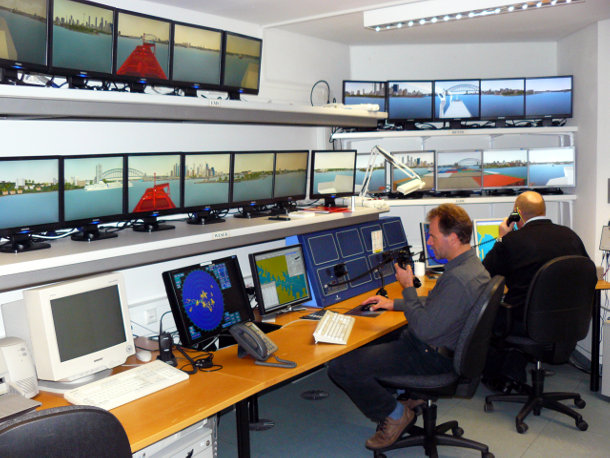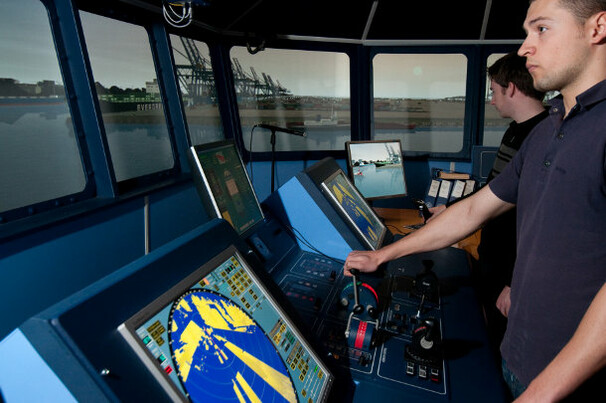The newly-built ship handling simulator was officially put into operation as part of the programme of the German national “Shipping Days” weekend in May 2001. It was built by Kongsberg Maritime Systems, the world’s leading ship handling simulator manufacturer, to replace the previously used radar simulator.
The exercises are led by one or two trainers in the instructors’ room. From here they can monitor and direct all the vessels in their particular traffic situations, and carry out all communication tasks (radio, email and telex).
The exercises are recorded and can then be reviewed during the discussion of manoeuvring techniques which follows in the de-briefing room, where they can be replayed if necessary and restarted from any point.
Next door there are two data-processing workstations with ship type and area modelling tools, and a third workstation where new exercises can be developed, or where a new trainer can be shown the ropes. These workstations can be used by students working towards their bachelor degree or as part of an elective.

Training
The simulator was primarily conceived and established for the training of the next generation of nautical officers. It can be used by students in the maritime faculty in Elsfleth or at the vocational training school of the Wesermarsch. No other maritime training establishment offers its students as much practically oriented simulator training time to prepare them for the tasks ahead in the real working world. Each student spends approximately 150 hours in total on training on the simulator. According to the study regulations, the hours are allocated as follows:
5th semester: Watchkeeping / Technical Navigation (8 x 45-minute periods per week per semester)
In the first part of their simulator training the students will be initiated in the operation of all the equipment found aboard ships, among them
- radar / ARPA equipment
- electronic sea charts
- GMDSS equipment (radio equipment)
- GPS, LORAN and other navigational devices
7th semester: Manoeuvring Exercises (4 x 45-minute periods per week per semester)
Students will be prepared for specific ship handling tasks in manoeuvring exercises and simple exercises in merchant shipping law and navigation. They should learn about the handling characteristics of different ship types and how to apply this knowledge when operating in confined waters (hydro-dynamic effects and how to use them), in standard manoeuvres (such as within ports, taking on pilots, using the anchor, harbour entrances, mooring) and by manoeuvres to avoid collision. This course also covers the use of landmarks, when proceeding according to leading and direction lights, for example.
8th semester: Complex Exercises (6 x 45-minute periods per week per semester)
In the first unit in the last semester the students practise safe ship handling under the conditions of a normal watch. In the second part of the course, participants are confronted with unusual situations at sea and on waterways and they practise, for example, the correct reaction to unexpected events, like equipment failure or the unpredictable behaviour of other vessels. Other scenarios practised are the emergency procedures to follow on one’s own ship if there is a collision with another vessel, and what course to follow, such as search and rescue manoeuvres, if another vessel is involved in an accident.
Research
The simulator is used not only in many ways in training, but also in research. The existing equipment is currently being used as part of a study by the faculties of Psychology and Computer Studies of the University of Oldenburg. Among other things, they are doing research into evaluation criteria during simulator training. We are participating in this study in view of the STCW evaluation requirements.
As a result of the change in the regulations regarding time spent at sea, pilots’ associations have expressed an interest in the co-operative development of basic and advanced training programmes. Working together with the pilots and the waterways and shipping administration, it would be possible to simulate the effects of the planned changes in the navigational channels and aids to navigation on the rivers Elbe, Weser, Jade and Ems, and to test their impact on safety. The only way to do this without incurring extra costs is to do it on our simulator, where all the data for a realistic simulation of the federal German coastal waters are stored.

